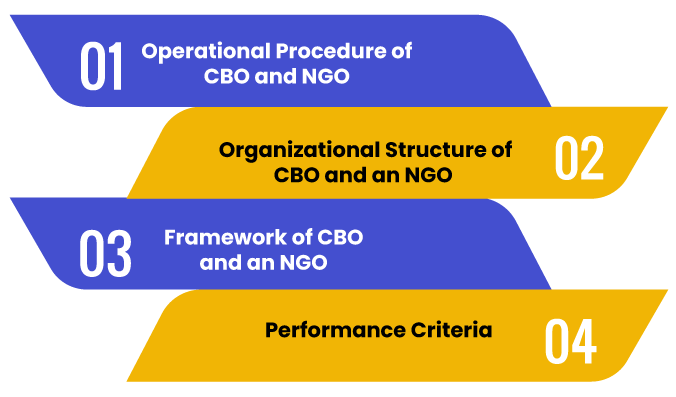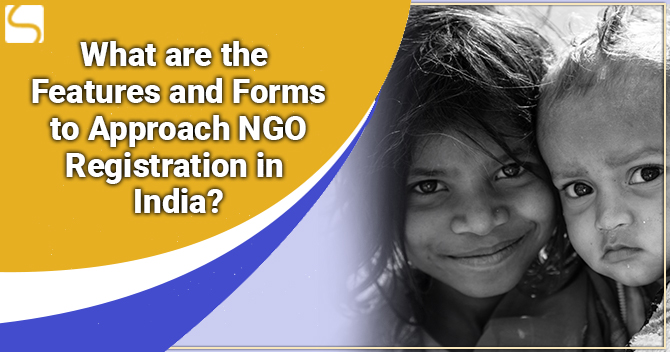Find the difference between CBO and an NGO

Japsanjam Kaur Wadhera | Updated: Jan 14, 2021 | Category: NGO
Non- Governmental Organization or NGO is a non-profit organization which can be formed in three ways, that is, Trusts, Society or Section 8 Company. CBO is an acronym for Community based Organization. The objective of both the organizations is the social welfare of the people and focus on dealing with the social, cultural, economic, religious aspects and issues existing in the society. Both of them are on identical grounds yet differ from each other. Therefore, this article will help you find the difference between CBO and NGO in India.
NGO is a full-fledged organization; it works at a national, regional or international level depending upon its reach and connectivity. Once the NGO registration is done, many benefits are provided to the NGO and one of them is tax exemption. NGO performs charitable work and deals with humanitarian, child labour, women and children’s rights, public policy, educational and environmental, policy advocacy and many more social causes to provide relief to the deprived section of the society. CBO on the other hand is the small version of NGO. It works on similar grounds but at a modest level. The working of the CBO is almost similar to NGO but it cannot match with the NGOs in terms of its reach. It works at the local level to improve life for residents.
Table of Contents
What is NGO?
NGO or Non- Governmental organization is an association that incorporate private organizations that works autonomous without the government control and are non-profit and non-criminal, non-religious and non-military organizations. One can apply for NGO registration. It is a charitable organization which functions to provide aid to the people and promote social welfare. It aims to deal with various social causes and provide relief to those who are facing it and are deprived of their rights. It may work at a national, regional or international level depending upon its connectivity and reach and aims to draw the attention of the government towards people’s grievances, promote political participation by providing information and advocating public policies.
NGO can be formed in three ways in India. That is:
- Trust
- Society
- Section 8 Company
What is CBO?
CBO[1] is a community based organization which is a non-profit organization that works at the local level to improve life for residents. The aim of CBO is to create equality among people in- environment, health care, access to technology, quality of education, knowledge for the disabled, access to spaces etc. the interference is that the communities represented by the CBO’s are typically at a disadvantage. CBO’s are typically staffed by local members that is, community members who experience the needs within their neighbourhoods. The sole link between the staff members and their interests is usually the willingness and will to help. The work performed by CBO’s is generally dealt with aspects like human services, urban environment safety, natural environment conservation or restoration, revitalization and etc.
Advantages of NGO
- Manageable funding sources.
- No interference in governance and politics.
- Has the reach of contacting high government officials.
- Are free to improvise the job plan depending upon the case.
Advantages of CBO
- Since CBO is restricted to a limited area, dealing with community problem is comparatively better than most NGOs.
- The employees of CBOs are usually local members. Therefore, chances of disagreements in the team are relatively less or next to zero.
- CBOs are more familiar with the development issues and local concerns. As they work at a grass- root level, it is easier for them to stipulate subtle solutions to the problems.
Difference between CBO and an NGO
Even though the grounds of social causes dealt by CBO and NGO are same, yet there are difference between CBO and an NGO which are as follows:

Operational Procedure of CBO and NGO
These organizations working protocol differs from governmental authorities. People do not make their selection for the sake of development. They voluntarily participate and work hard for the well being of the people. There is no substantial source of income or funds. Their focus is to provide aid to the people and assures unity.
Organizational Structure of CBO and an NGO
The organizational structure difference between CBO and an NGO is: –
NGO is a full-fledged organization that works for the social welfare of the people. CBO’s are the smaller version of NGOs. The working protocol of CBO is almost similar to NGOs but it cannot match with the NGOs in terms of its reach. CBO is a group of fanatical workforce that stands and support for a standard motive for a particular area. No legal authority controls the actions of CBO.
On the other hand, NGOs work on a broader scale and therefore, they need more assertion as a team. The Non- Governmental Organization is accountable to reply to the authority, when performing for a social cause or particular actions. The working scenario of NGOs is continuously monitored by a selected hierarchy and it is the duty of the NGOs to work in accordance with the specific guidelines and principles.
Even though CBO is similar to NGO as both of them contribute towards humanity and social cause, there still exist some difference between CBO and an NGO in terms of organization structure, labour and framework etc.
Framework of CBO and an NGO
The difference between CBO and an NGO in terms of Framework is that the NGO is backed by enough members who work dedicatedly for the social welfare on the massive spectrum. Whereas, there is no legal bound criteria required or affects the working of the CBO. It is easy to form and does not require any legal formalities in performing its function. It is an association backed by people that voluntarily participate for a good cause and assures welfare of the community.
Performance Criteria
An NGO works to address the social causes in the society on a broader spectrum. It focuses on supporting in many states and deals with issues prevailing there. On the other hand, CBO works to address the social cause in a small community only.
Conclusion
It is obvious that even though NGOs and CBOs are formed to address the social issues and provide relief to the people who are deprived of their rights and give guidance to underprivileged people, while keeping moral values sound. Yet there is difference between CBO and an NGO on various aspects. NGO works on a broader spectrum whereas; CBO works with a particular community. There is more difference between the two which has been discussed above in the article.
Also, Read: What is the Strategy to Expand and Improve NGO organization?















